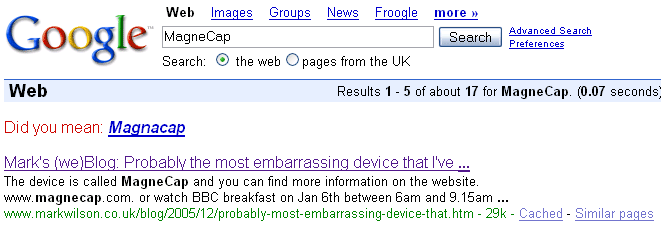A few weeks back, I wrote about a device (called Diesel Guard) that I’d been told to fit to my company car to help prevent accidental mis-fuelling. A couple of weeks later, someone posted a comment on the post about an alternative product (called MagneCap). At the time, I thought of it as a bit of friendly advice and I didn’t think anything more of it, but now it looks as if the comment was blog spam (which, incidentally, is specifically mentioned as prohibited in the rules for comments on this site).
The thing is, that at the time of writing, this blog has a higher Google page rank than the official site for MagneCap. That means that if you search Google for MagneCap, what comes back is not what the owners of the MagneCap site would like to see:

(especially as, out of context, the quote reads as if it’s MagneCap that’s the embarrassing product, rather than Diesel Guard!)
Yesterday afternoon, I received an e-mail asking me if I had any ideas to correct the “incorrect heading” but there is absolutely nothing I can do about Google’s index (which is quite correct in quoting the title of the page and a couple of lines from the blog spam comment). Either I, or the author, could remove the original blog spam comment (in which case I would also remove the following two anonymous comments, which I also suspect are blog spam as the timing is remarkable at 45 and 50 minutes after the e-mail asking for help…) but Google’s cached version will still be available online. I also suggested that MagneCap take out a paid ad so that their site appears above Google’s standard search results. Because I genuinely believe that this was simple product placement and not malicious in any way, I’m also writing this post, so that hopefully Google will pick this up as the next entry and it might become clear that MagneCap was not the embarrassing device which I originally wrote about.
Just like Aesop’s fables, there is a moral to this tale… if you feel like engaging in a bit of product placement on someone else’s website, ask them first. Or at least make sure the blog spam gives the message you want if only a few words are quoted out of context by a search engine.
I’m pleased to see that the official MagneCap site is now the first result on a Google search.